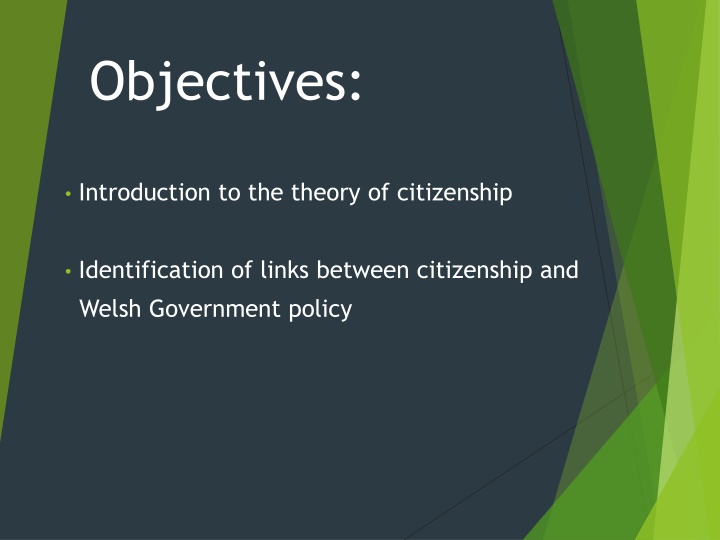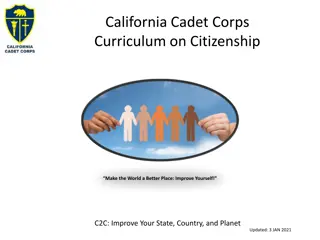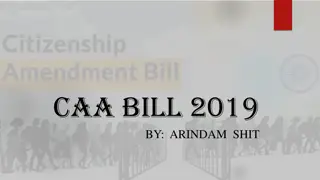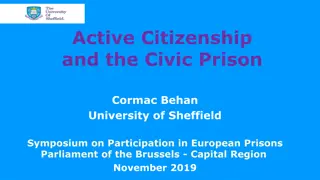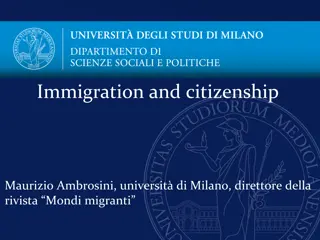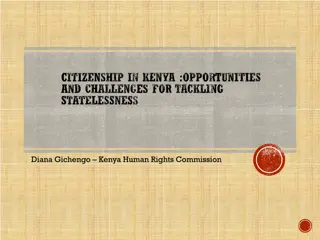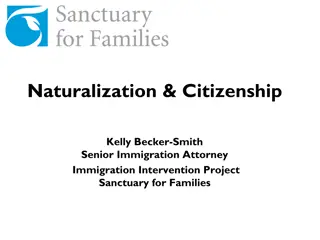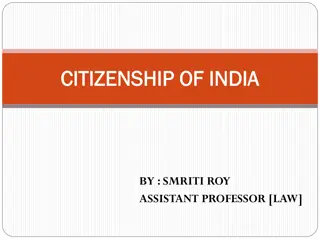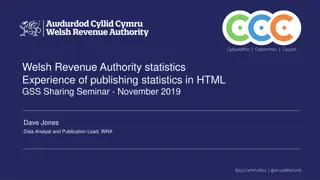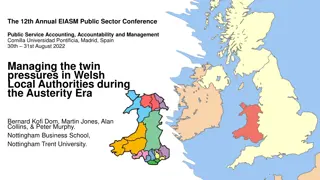Theory of Citizenship and Welsh Government Policy Links
Understanding citizenship theory and its connection to Welsh Government policies is essential for promoting a seamless health and care system in Wales. The parliamentary review emphasizes the importance of citizen involvement, co-production, and mutual respect between individuals and health organizations to achieve improved health outcomes and workforce engagement.
Download Presentation

Please find below an Image/Link to download the presentation.
The content on the website is provided AS IS for your information and personal use only. It may not be sold, licensed, or shared on other websites without obtaining consent from the author.If you encounter any issues during the download, it is possible that the publisher has removed the file from their server.
You are allowed to download the files provided on this website for personal or commercial use, subject to the condition that they are used lawfully. All files are the property of their respective owners.
The content on the website is provided AS IS for your information and personal use only. It may not be sold, licensed, or shared on other websites without obtaining consent from the author.
E N D
Presentation Transcript
Objectives: Introduction to the theory of citizenship Identification of links between citizenship and Welsh Government policy
Parliamentary Review of Health and Social Care in Wales (Welsh Government, 2018) The review had Terms of Reference (i.e. the scope and boundaries of a review) to: Define the key issues facing health and social care - Identify where change is needed and the case for change - - Set out the vision for the future including moving health and social care forward together, developing Primary Care services out of hospitals - Advise on how change can be delivered, building on the positive aspects of the current system
The parliamentary review report (Welsh Government, 2018, p.6) Has called for: One system of seamless health and care for Wales - A Quadruple aim to: - a. improve population health and wellbeing through a focus on prevention b. improve the experience and quality of care for individuals and families
c. enrich the wellbeing, capability and engagement of the health and social care workforce d. increase the value achieved from funding of health and care through improvement, innovation, use of best practice, and eliminating waste Citizenship through co-production and mutual respect between social care and health organisations and individuals is seen to be essential to achieving this vision within the review.
Parliamentary Review of Health and Social Care in Wales (2018) Please read pp. 8-9 which is a summary of ten recommendations in the report. Where are citizens mentioned in the recommendations and what should citizens do? What other terms are used in relation to citizens?
We will now look at the theory of citizenship and how it will always be debated in society Your thoughts? What is a citizen? What is citizenship?
Citizen: Inhabitant or resident Context specific, e.g. Home Office guidance British citizenship gives you the opportunity to participate more fully in the life of your local community (Home Office, 2018, p. 3) Being a citizen of the UK gives you an ability to vote, a sense of identity, an ability to work and deliver services and to access services
Citizenship (Home Office, 2018) There are residence requirements. You are expected to have good character (i.e. no criminal convictions, civil proceedings, cautions, warnings or reprimands). This is the basis of you living in the UK.
But citizenship goes deeper than that..... Citizenship can be defined as the relationship between an individual, his or her community and ultimately the government (including others in power), but also as a member of a society or political community. (Dwyer, 2004; Rummery and Fine, 2012; Larkins, 2014; Clarke et al. 2014)
Citizenship can be seen to evolve from a history of different political ideologies (thoughts and beliefs) and debates about the role that the government should play in people s lives this is ongoing.
This links with wider ongoing academic and social debates about relationships between individuals and their society, for example: - What makes a good citizen? - Why is citizenship important? - What role does power have?
An example of a political ideology that has influenced ideas on citizenship is individualism arguments are: We should leave it to individuals to make the most of the capitalist system those who succeed pay corporation and personal tax benefiting society as a whole and so what s the problem? Wage regulation and welfare provision result in an over-reliance on the State (government). An example of this political ideology is the New Right Conservative government 1979-1997.
Another example of a political ideology that has influenced ideas on citizenship is collectivism arguments are: This supports the values of fraternity (common purpose), liberty and equality which are believed to support the full productive potential of society. Universal benefits are one means of addressing inequalities perpetuated by the market (capitalism). An example of this political ideology is the Labour party and Liberal party.
Question What do you think might be the main criticisms of these two political ideologies?
Main criticisms of individualism Not everyone starts from an equal position think of disadvantage and discrimination. Market forces do not guarantee positive outcomes think about the past world banking crisis. Capitalism can support exploitation hence government intervention, e.g. legislation on health and safety in the workplace and the minimum wage to protect against exploitation.
Main criticisms of collectivism This can result in individuals exploiting State provision it creates a situation where some people who do not want to work (as opposed to who cannot work) can occupy this position because of support from the State (funded by tax payers money). Collectivism does not respect or promote the autonomy (independence) of individuals to determine their individual pathway.
Welsh Government policy There has been a rejection of market forces, e.g. social care and health (citizen in Wales and consumer in England). Welsh Government policy equates citizenship with voice, control and a reciprocal (two way) relationship between citizens and the State; and between service providers and individuals (service users).
Welsh Government policy There is a view that citizenship ensures participation and inclusion of all members of society and that services should be seamless and integrated as an appropriate response to citizens needs and aspirations. (Welsh Assembly Government, 2006; Welsh Government, 2014, 2018)
Citizenship is about: Voice and control Individuals (the service user movement) Political ideologies Rights and responsibilities it s about what you are entitled to expect from society but also what you are expected to contribute. (Fitzpatrick, 2005; Flynn, 2012; Rummery and Fine, 2012; Clarke et al. 2014; Larkins, 2014)
The implications of the citizenship model for social care and health services The citizenship model requires citizens to be at the centre of service delivery that is integrated and seamless as opposed to fitting around services that are fragmented and confusing. Citizens should expect to have a voice and choice in how their services are delivered. (Welsh Assembly Government, 2006; Welsh Government, 2014, 2018)
Some examples of citizenship in practice Welsh Government policy (Welsh Assembly Government, 2006; Welsh Government, 2014, 2018) continues to support a citizenship framework and this can be seen in its support for the following practices: Service integration (seamless services) Advocacy Co-production
References Clarke, J., Coll, K., Dagnino, E. and Neveu, C. (2014) Disputing citizenship. DOAB Directory of Open Access Books [Online]. Available at: https://doabooks.org/ (Accessed: 1 February 2019). Dwyer, P. (2004) Understanding social citizenship: themes and perspectives for policy and practice. Bristol: Policy Press. Fitzpatrick, T. (2005) New theories of welfare. Houndmills, Basingstoke, Hampshire; New York: Palgrave Macmillan. Flynn, N. (2012) Public sector management. 6th edn. London: SAGE. Home Office (2018) Naturalisation as a British citizen: a guide for applicants. Available at: https://assets.publishing.service.gov.uk/government/uploads/system/uploads/attachment_ data/file/739936/AN_Guide_-_September_2018_Final.pdf (Accessed: 1 February 2019). Larkins, C. (2014) Enacting children s citizenship: Developing understandings of how children enact themselves as citizens through actions and acts of citizenship , Childhood, 21(1), pp. 7 21. SAGE Premier [Online]. Available at: https://uk.sagepub.com/en-gb/eur/sage-premier (Accessed: 1 February 2019).
References Rummery, K. and Fine, M. (2012) Care: A Critical Review of Theory, Policy and Practice , Social Policy & Administration, 46(3), pp.321-343. Wiley Online [Online]. Available at: [Online]. Available at: https://uk.sagepub.com/en-gb/eur/sage-premier (Accessed: 1 February 2019). Welsh Assembly Government (2006) Beyond boundaries: ciizen-centred local services for Wales. Available at: http://www.wales.nhs.uk/sitesplus/documents/829/WAG%20- %20Beyond%20Boundaries%20%28Beecham%20Review%29%202006.PDF (Accessed: 1 February 2019). Welsh Government (2014) Commission on public service governance and delivery: summary report.Available at: http://gov.wales/docs/dpsp/publications/psgd/140120-psgd-summary-report-en.pdf (Accessed: 1 February 2019). Welsh Government (2018) Parliamentary review final report a revolution from within: transforming health and care in Wales. Available at: http://gov.wales/topics/health/nhswales/review/?lang=en (Accessed: 1 February 2019).
